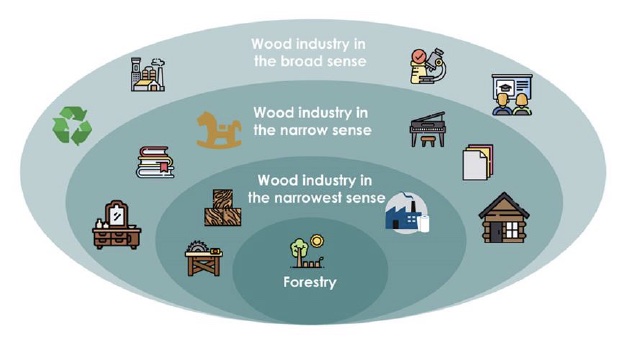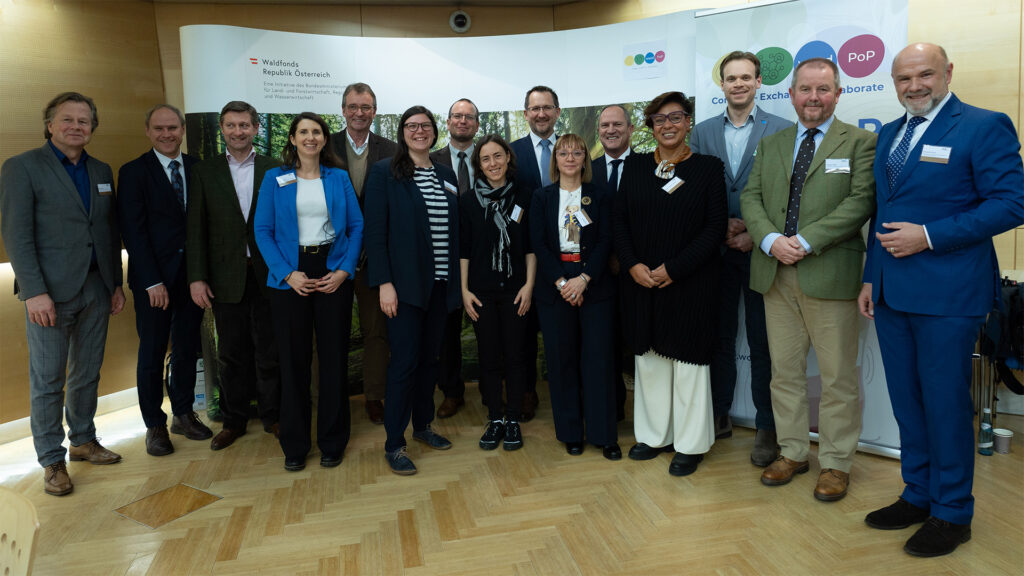Technical Working Group Governance Meeting
As part of the International Wood Construction Conference in Innsbruck, Austria, on 29 November 2023, a Special Meeting of the woodPoP Technical Working Group Governance was dedicated to recent developments in wood governance across Europe and beyond.
The importance of the forestry and wood industry in Europe
The recently published study «Economic Impact of the Forestry and Wood Industry in Europe» covering the EU27 including Norway, Switzerland and the United Kingdom highlights that the importance of the sector for creating value added, purchasing power and employment is vastly underestimated.
The study calculated a total gross value added of the European forestry and timber industries amounting to 1.1 billion euros. In fact, the wood value chain extends across an extensive network from raw material processing, higher- grate, and high- quality intermediate and end products. As cross-sectoral industry, it contributes to many different sectors across the economy. As such, it secures around 17.5 million jobs across Europe, which amounts to 1 in 16 jobs being directly or indirectly generated by the forestry and wood industry.

A wealth of initiatives to support the sustainable use of wood and the wood-based value chain
There is a wealth of initiatives to support the sustainable use of wood and the wood-based value chain. Successful national best practice on wood construction such as the German Charta for Wood, the British Colombia Mass Timber Action Plan or the Japanese wood construction regulations can help gain public attention and raise awareness.
Going forward, it will be important to build a stronger case on how wood-based solutions can contribute to decouple economic growth from emissions. In this regard, the important role of the wood industry and forest owners, and the need for support across the entire value chain to continue to assure the supply of sustainable wood in the light of increased demand. Effective roll-out of innovations accompanied by long-term policy and legislative frameworks are central in view of facilitating a transition towards a wood-based bioeconomy. Furthermore, the attractiveness of the sector for youth remains an area for action as well as increasing offers for educational training and skills development within the sector.
In addition, important EU initiatives such as the ambitious New European Bauhaus, which integrates art, environment, ecosystems and healthy living should not be lost. Wood construction and the Wood4Bauhaus initiative play an important role and should be further used as catalyst for the use of wood.
Finally, best-practices from other regions and international experiences should also be integrated in these outreach efforts. Moving towards a sustainable low-carbon bioeconomy has emerged a global goal. The project Wood For Globe aims to strengthen wood policy networks and platforms by mobilising policy makers, scientists and society to exchange knowledge, experience and good practices globally. It takes stock of technical and scientific knowledge, policies and initiatives globally. It contributes to developing a definition of sustainable wood policies on a global scale: Sustainable wood policies could be a set of policies, programs, initiatives and practices designed to promote the responsible management of forests and the production of wood and wood products.
Through its Technical Working Groups, woodPoP gives policy-makers, experts and stakeholders a unique opportunity to exchange, elaborate, multiply and further develop wood-related policies on the issues highlighted above. As a cross-sectorial initiative, it creates a new momentum for the sustainable and innovative use of wood.
Downloads
- Agenda
- The economic impact of the forestry and wood industry in Europe – Anna Kleissner
- The European Wood Policy Platform (woodPoP) Technical Working Groups
-
Fostering the sustainable use of wood:
“Charter for Wood 2.0” and “Timber Construction Initiative” – Dirk Alfter - British Columbia – initiatives fostering the sustainable use of wood – Graham Hilton
- Recent Mid- and High-Rise Timber Construction in Japan and its Features – Takahiro Tsuchimoto
- Towards a Global Wood Policy Platform: Sustainable Wood for a Carbon-neutral Bioeconomy – Thais Linhares Juvenal
- The European Union Forestry Strategy. A critical review. High Level Group (HLG) Forestry & Biomaterials – João Lé
- Contributing to a carbon neutral bioeconomy – CEI Bois & EOS – Silvia Melegari
- Bioeconomy Austria – Fabian Huber



